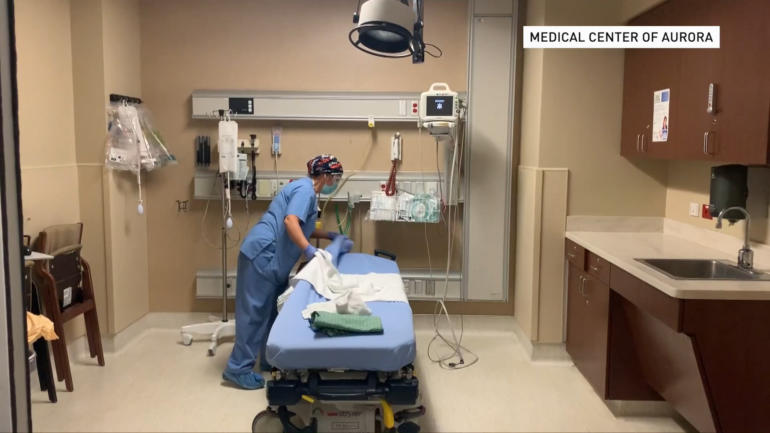The COVID-19 pandemic has presented a huge challenge to U.S. hospitals. Many of them have experienced surges of coronavirus patients in the past few months.
All had to cancel non-emergency surgeries for a time this spring. That’s affected their financial bottom lines and led to significant layoffs.
CGTN’s Hendrik Sybrandy reports from the state of Colorado.
It’s been an unprecedented time for America’s 5,200 hospitals. The ones that were overwhelmed by COVID-19 patients, like Medical Center of Aurora, Colorado.
“Just yesterday we discharged a patient that’s been in the hospital for 76 days,” said Dr. Phil Stahel, the hospital’s Chief Medical Officer. “Two and a half months.”
And those that weren’t, like Delta County Memorial Hospital, 470 kilometers to the west. “There are other communities that were hit much harder than we were,” said Matt Heyn, the hospital’s C.E.O.
Heyn said the impact to his facility has been felt financially. “Pretty significant,” he said. “We saw a 20 percent decrease in our net patient revenue in the month of March. April was down 46 percent.”
A $4.6 million loss at the Delta hospital in the two months combined. When hospitals were told to cancel non-emergency surgeries in March for safety reasons and to free up bed capacity, a revenue stream they depend on to stay viable was cut off. “COVID has had a tremendous financial impact,” Stahel said, adding that patient volumes and revenues at his facility were down significantly in April and May.
“We’re expecting a 4.1 billion dollar impact to hospitals through the end of the year due to COVID,” said Katherine Mulready, Colorado Hospital Association Senior V.P. And, she pointed out, that’s just in her state.
“Certainly the economy has impacted people’s ability to afford elective procedures, if they can wait,” she stressed.
The economy has also led many more Americans to enroll in Medicaid, a public assistance program that doesn’t fully reimburse hospitals for the health care they provide. While federal pandemic relief dollars have helped these facilities. “That helped decrease some of the losses,” Heyn said.
He said holding onto business remains a challenge at a time of urban migration, when he argued rural health care is under attack.
“We should be able to keep those patients local just so long as we continue to provide a high-quality product,” Heyn said.
Although 1.4 million healthcare workers in the U.S. lost their jobs in April, both the Delta and Aurora hospitals have managed to avoid layoffs. “We are extremely proud of that accomplishment,” Stahel said.
He said some belt-tightening has been required. Spine surgeons who rely on expensive implants were asked:
“Would you be amenable to using not a cheaper implant but an equivalent implant of lesser cost and we’ve been able to save significant money with that,” Stahel said.
Most but not all elective surgeries have now resumed. Hospitals remain on guard for further COVID-19 surges. Colorado has been less hard hit than other states. “While we’re doing okay today, the story may be a different a year from now,” Mulready said.
Without hospitals, Mulready pointed out, we don’t have a functioning society. In many ways, 2020 is putting these critical places to the test.
 CGTN America
CGTN America
